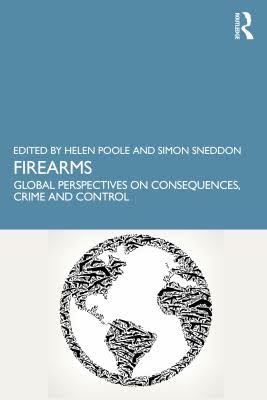New Firearms book gauges extent of global problem

ACADEMICS researching gun-crime have published a book which gives sight of a global problem which claims more than 200,000 lives a year.
Firearms: Global Perspectives on Consequences, Crime and Control published by Routledge, explores the illicit use of firearms across the globe, including legal, social science, technical and research perspectives on the issue.
Co-edited by Dr Helen Poole, Executive Dean of the School of Crime, Justice and Security at Staffordshire University and Dr Simon Sneddon of University of Northampton, the book includes contributions from notable experts covering weapon trafficking, responses to firearms crime and impacts on society.
Dr Poole explained: “Over 200,000 people per year are killed by firearms outside of conflict zones, and this does not even begin to cover those who sustain life changing injuries, or those secondary victims who witness violence, deal with it as emergency responders, or who lose the key provider in their family in countries where there is no welfare support to fall back on. Furthermore, although violence has been reducing globally, firearms related violence is still increasing.
“In part this is the result of the availability of illicit firearms which have accumulated during periods of conflict or have been diverted from the legal market as a result of theft and corruption. Over 80% of illegally held firearms are manufactured legally but are diverted into the illicit market.”
“There is also an emerging threat from 3D printed weapons which, whilst still a small part of the picture, are becoming more viable and increasingly featuring in violent crime. This book is intended to bring these issues to life and to inspire individuals to be motivate to take action in order to bring about positive social change.”
Dr Sneddon said: “The threats posed to societies by firearms are many and varied. Organised criminality, terrorism, patchy legislation, weak law enforcement and corruption all combine, and serve to amplify the dramatic consequences of firearms use. This book looks at both the legal and illegal trades, and brings the reader into contact with policy and legislative measures that have been designed to curb the threat posed by firearms. The contributors identify the strengths and weaknesses of different approaches taken to reduce firearms crime, and discuss the roles played by legitimate firearms users.”
Employing a global set of case studies, the book introduces students to the core issues related to firearms markets, national and international legal frameworks to control firearms and the role of civil society in affecting change and how students can get involved through research and action.
Dr Poole added:”Much of this is about awareness raising and education, however, it is also about civil society groups lobbying for change. There is some evidence that initiatives around outlawing legal ownership of the most lethal firearms such as handguns among the public have merit; similarly ensuring there are robust licensing rules with stringent background checks for those using firearms for conservation and sport.”
Firearms will be of interest to students of Criminology, Criminal Justice, International Law, International Development, Policing, Crime Control and Community Safety.
Maria Scrivens
Communications Manager
t: 01782 294375
m: 07766 520339
e: m.c.scrivens@staffs.ac.uk
Staffordshire University is the Connected University; connected to the needs of students, academic partners, business and society. Our main city campus in Stoke-on-Trent features excellent learning and teaching facilities and good transport links. We have specialist Centres of Excellence in Healthcare Education at Stafford and Shrewsbury.
We were recognised with a Gold award in the 2019 Teaching Excellence and Student Outcomes Framework (TEF) for delivering consistently outstanding teaching, learning and outcomes for students.
We were shortlisted for University of the Year at the THE Awards 2020 and were named ‘Midlands University of the Year’ at the Midlands Business Awards 2020.
Staffordshire University has signed up to the Civic University Agreement, pledging to play a leading role in improving the regional economy and enhancing quality of life in local communities. We were recognised in the top 15 for social inclusion in The Times and Sunday Times Good University Guide 2021. We aim to be a leading university for digital technologies building on our proud computing heritage and in 2019 launched Staffordshire University London’s Digital Institute which is committed to preparing students for careers in new and emerging tech industries.
We are a Top 250 Young University (Times Higher Education Young University Rankings 2020) and are connected globally, with more than 11,000 people studying Staffordshire University degrees overseas.


